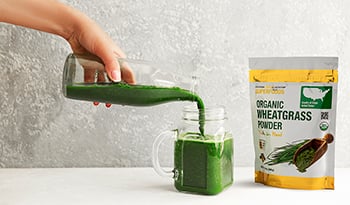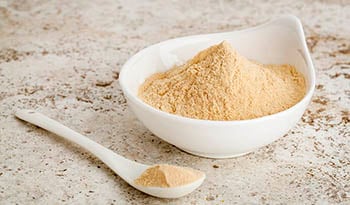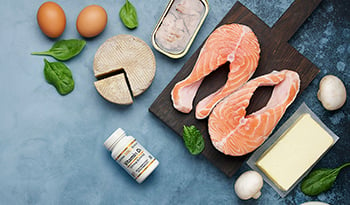How to Boost Your Coffee's Nutrition with Simple Ingredients

Who doesn’t love a nice hot cup of coffee first thing in the morning? A good cup of coffee can provide the energy boost needed to help you get out of bed and start the day. A quick shot of caffeine may also help improve focus and clarity, but everyone knows that the smell of a hot—or iced—a cup of coffee can only be beaten by the hearty taste.
Research suggests that the caffeine from your morning coffee may have some profound health benefits ranging from boosting energy levels and supporting heart health to the possible prevention of diseases like Alzheimer’s and Parkinson’s.
While drinking regular coffee may have health benefits, adding these simple ingredients to your morning cup of joe may help boost flavor and increase the nutrition of your favorite morning drink.
Butter Coffee
Nearly every coffee drinker has heard of butter coffee. This tasty drink recipe involves putting 1-2 tablespoons of butter into 1 cup or 8 to 12 ounces of coffee. Blend until creamy, and enjoy.
Why would anyone want to add butter to coffee? Adding high-quality fats to coffee may have some amazing health benefits.
Adding butter to coffee may help to improve energy levels and keep them steady. Because caffeine gives a quick energy boost and the fats in butter take longer to digest, energy levels may remain stable without the crash that can often come from a quick dose of caffeine and sugar.
Studies also suggest that healthy fats have some positive health benefits. And potential health benefits aren’t only associated with butter. Other fats, such ghee or clarified butter, medium chain triglycerides (MCT) oil, or coconut oil, can also be added to coffee for a flavorful and nutritional boost.
For example, studies link ghee consumption with a lower incidence of cardiovascular disease in men. Studies also suggest that coconut oil increased high-density lipoprotein, HDL or “good cholesterol,” levels in the body.
Cinnamon Coffee
While cinnamon may not be the first thing that comes to mind when thinking of coffee, adding this sweet spice to a cup of may have amazing health benefits.
Research suggests that cinnamon may help to lower blood sugar in individuals with diabetes and metabolic syndrome. For example, one study examining cinnamon found that it not only helped to lower blood sugar levels, it also helped to create more proteins involved in insulin signaling and helped regulate lipid or fat production in the body.
One meta-analysis, a study that combines data from multiple studies, found that cinnamon helped to reduce fasting blood sugar, cholesterol, and triglycerides. The same study found that cinnamon helped increase HDL, the “good cholesterol.”
Studies also suggest that cinnamon's health benefits may include lowering blood pressure and free radical scavenging abilities. The powerful synergism of coffee and cinnamon can make a flavorful and ultra-nutritious duo.
Collagen Coffee
Collagen is a protein produced by the body. Collagen makes up about 30% of the body’s total proteins and helps to support bones, muscles, connective tissue, and skin. While collagen helps maintain and support the body's structures, studies show that it may also play a role in overall health.
For example, one study found that ingesting oral collagen helped to decrease pain from osteoarthritis while at the same time increasing bone cell growth and proliferation. Moreover, collagen also may benefit the appearance and overall health of the skin. A meta-analysis involving 1,125 individuals found that oral supplementation with collagen over a 3-month time frame led to increased skin hydration, better skin elasticity, and fewer wrinkles. Those who took the collagen supplement had, overall, more youthful-looking skin.
Another study found that oral collagen intake may benefit skin health by increasing collagen density in the dermis or middle layer of the skin. The dermis supports the epidermis, the outer layer of the skin. With age, the dermis loses collagen and becomes less stable, causing the outer layer of the skin to lose its youthful look. Studies suggest that collagen intake may be able to prevent this.
Drinking collagen coffee is an easy and delicious way to increase collagen intake in the diet. While there is a belief that adding collagen to coffee will cause the protein to be damaged and rendered ineffective, this usually isn’t the case. Collagen becomes damaged or degraded at around 160 degrees Fahrenheit or 71 degrees Celsius. Having a warm cup of coffee at 155 degrees Fahrenheit or 68 degrees Celsius shouldn’t affect the integrity of the collagen.
Adding flavored collagen, like vanilla or chocolate, to a cup of coffee can help give it a nutritional and flavorful boost.
Cocoa Powder Coffee
Anyone who has had a mocha knows that coffee and chocolate make a tasty combination. Adding cocoa powder to your morning coffee cup may have exceptional health benefits.
Studies suggest that cocoa powder may benefit cardiovascular health. Caffeine in both coffee and cocoa is metabolized in the body into compounds called dimethyxanthines. Studies show that methylxanthines may help improve type 2 diabetes and liver health. Moreover, cocoa may have an anti-inflammatory and heart-protective effect by increasing nitric oxide bioavailability, improving platelet function, and decreasing blood pressure.
The caffeine in both coffee and cocoa is already known as an energy booster that may improve focus and feelings of alertness, but cocoa powder may also be a helpful mood enhancer. One double-blind, randomized, placebo-controlled study involving cocoa found that the participants in the cocoa group had fewer depressive feelings and higher levels of dopamine activity.
Adding cocoa powder to coffee may have a powerful synergistic effect that boosts mood and productivity.
Ginger Coffee
Ginger coffee may sound intimidating because coffee and ginger have an earthy, bitter profile, but adding ginger to your coffee may have some delicious and exceptional health benefits.
Ginger is a root herb used as a traditional medicine for centuries. Studies suggest that it may also have some powerful anti-inflammatory properties. One study found that ginger helped lower inflammation in overweight women with high blood sugar levels.
Taking a ginger supplement helped to reduce C-reactive protein (CRP) levels in the body. High CRP levels are indicative of high levels of inflammation. An anti-inflammatory, ginger may also help reduce pain. One study involving 36 participants with muscle pain found that daily supplementation of ginger for 11 days significantly reduced the perception of muscle pain.
Studies suggest that ginger may also help to lower pain associated with osteoarthritis. One double-blind, placebo-controlled study involving 120 individuals with osteoarthritis of the knees found that three months of ginger supplementation was associated with less inflammation and a lower amount of pro-inflammatory cytokine production in the body.
While you can add freshly juiced ginger to your coffee, research suggests that dried ginger is more effective. Add one teaspoon to your morning cup of joe to boost flavor and nutrition. If you find that ginger in your coffee is too pungent, add some maple syrup or stevia to mellow out the last.
Mushroom Coffee
Mushroom coffee is taking off in popularity, and for good reasons. Mushrooms commonly used in coffee include lion’s mane, reishi, turkey tail, and cordyceps. Studies suggest that mushrooms like lion’s mane and cordyceps act as nootropics. Nootropics are compounds that enhance and support brain function and cognition.
One double-blind, randomized, placebo-controlled study involving lion’s mane mushroom found that the participants receiving the lion’s mane intervention had higher cognitive function tests scores than the placebo group.
Other research indicates that mushrooms like turkey tail and reishi may be potent immune system boosters that help to stimulate cytokine production. One randomized study involved child participants eating a yogurt-and-reishi mushroom preparation. After 12 weeks, the study found that the children who received the yogurt and reishi intervention had a higher level of immune cells and antibodies circulating in the bloodstream with no adverse side effects.
With the synergistic effects of caffeine and mushrooms like lion’s mane, reishi, turkey tail, and cordyceps, mushroom coffee may boost energy and improve cognition.
Takeaway
Coffee is a beverage loved worldwide. With a bold rich taste and caffeine to boost energy and focus, why not make your next cup of coffee even more flavorful and nutritious by adding healthy fats, herbs, spices, and fungi!
To give your coffee a boost in optimal flavor and nutrition, try adding in some butter or MCT oil, cinnamon, collagen, cocoa powder, ginger, or mushrooms, and enjoy your morning cup of joe even more.
References:
- Allen RW, Schwartzman E, Baker WL, Coleman CI, Phung OJ. Cinnamon use in type 2 diabetes: an updated systematic review and meta-analysis. Ann Fam Med. 2013;11(5):452-459. doi:10.1370/afm.1517
- Benson KF, Stamets P, Davis R, et al. The mycelium of the Trametes versicolor (Turkey tail) mushroom and its fermented substrate each show potent and complementary immune activating properties in vitro. BMC Complement Altern Med. 2019;19(1):342. Published 2019 Dec 2. doi:10.1186/s12906-019-2681-7
- Bidel S, Tuomilehto J. The emerging health benefits of coffee with an emphasis on type 2 diabetes and cardiovascular disease. Eur Endocrinol. 2013;9(2):99-106. doi:10.17925/EE.2013.09.02.99
- Black CD, Herring MP, Hurley DJ, O'Connor PJ. Ginger (Zingiber officinale) reduces muscle pain caused by eccentric exercise. J Pain. 2010;11:894–903.
- Choi FD, Sung CT, Juhasz ML, Mesinkovsk NA. Oral collagen supplementation: a systematic review of dermatological applications. J Drugs Dermatol. 2019;18(1):9-16.
- Daneault A, Prawitt J, Fabien Soulé V, Coxam V, Wittrant Y. Biological effect of hydrolyzed collagen on bone metabolism. Crit Rev Food Sci Nutr. 2017;57(9):1922-1937. doi:10.1080/10408398.2015.1038377
- de Miranda RB, Weimer P, Rossi RC. Effects of hydrolyzed collagen supplementation on skin aging: a systematic review and meta-analysis. Int J Dermatol. 2021;60(12):1449-1461. doi:10.1111/ijd.15518
- Gupta R, Prakash H. Association of dietary ghee intake with coronary heart disease and risk factor prevalence in rural males. J Indian Med Assoc. 1997;95(3):67-83.
- Henao SLD, Urrego SA, Cano AM, Higuita EA. randomized clinical trial for the evaluation of immune modulation by yogurt enriched with β-glucans from lingzhi or reishi medicinal mushroom, Ganoderma lucidum (Agaricomycetes), in children from Medellin, Colombia. Int J Med Mushrooms. 2018;20(8):705-716. doi:10.1615/IntJMedMushrooms.2018026986
- Khaw KT, Sharp SJ, Finikarides L, et al. Randomised trial of coconut oil, olive oil or butter on blood lipids and other cardiovascular risk factors in healthy men and women. BMJ Open. 2018;8(3):e020167. Published 2018 Mar 6. doi:10.1136/bmjopen-2017-020167
- Kris-Etherton PM, Keen CL. Evidence that the antioxidant flavonoids in tea and cocoa are beneficial for cardiovascular health. Curr Opin Lipidol. 2002;13(1):41-49. doi:10.1097/00041433-200202000-00007
- Mallard B, Leach DN, Wohlmuth H, Tiralongo J. Synergistic immuno-modulatory activity in human macrophages of a medicinal mushroom formulation consisting of Reishi, Shiitake and Maitake. PLoS One. 2019;14(11):e0224740. Published 2019 Nov 7. doi:10.1371/journal.pone.0224740
- Mori K, Inatomi S, Ouchi K, Azumi Y, Tuchida T. Improving effects of the mushroom Yamabushitake (Hericium erinaceus) on mild cognitive impairment: a double-blind placebo-controlled clinical trial. Phytother Res. 2009;23(3):367-372. doi:10.1002/ptr.2634
- Mozaffari-Khosravi H, Naderi Z, Dehghan A, Nadjarzadeh A, Huseini HF. Effect of ginger supplementation on proinflammatory cytokines in older patients with osteoarthritis: outcomes of a randomized controlled clinical trial. J Nutr Gerontol Geriatr. 2016;35:209–18.
- Poles J, Karhu E, McGill M, McDaniel HR, Lewis JE. The effects of twenty-four nutrients and phytonutrients on immune system function and inflammation: A narrative review. J Clin Transl Res. 2021;7(3):333-376. Published 2021 May 27.
- Ranasinghe P, Pigera S, Premakumara GA, Galappaththy P, Constantine GR, Katulanda P. Medicinal properties of 'true' cinnamon (Cinnamomum zeylanicum): a systematic review. BMC Complement Altern Med. 2013;13:275. Published 2013 Oct 22. doi:10.1186/1472-6882-13-275
- Sharma S, Mandal A, Kant R, Jachak S, Jagzape M. Is cinnamon efficacious for glycaemic control in type-2 diabetes mellitus? J Pak Med Assoc. 2020;70(11):2065-2069.
- Shashidhar MG, Giridhar P, Udaya Sankar K, Manohar B. Bioactive principles from Cordyceps sinensis: A potent food supplement - A review. J Funct Foods. 2013;5(3):1013-1030. doi:10.1016/j.jff.2013.04.018
- Tuenter E, Foubert K, Pieters L. Mood Components in cocoa and chocolate: the mood pyramid. Planta Med. 2018;84(12-13):839-844. doi:10.1055/a-0588-5534
DISCLAIMER:This Wellness Hub does not intend to provide diagnosis...
















































































 Table of Contents
Table of Contents
















